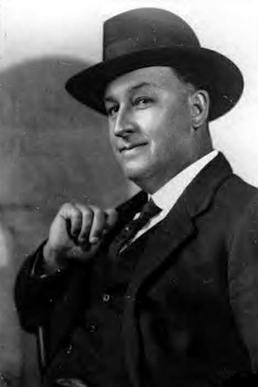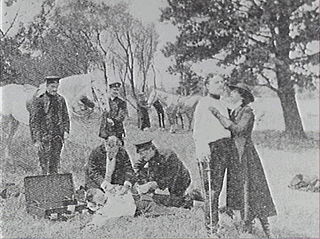Related Research Articles

Thunderbolt is a 1910 film in the genre of "outlaw" films at the time that tended to glorify the life of the outlaw "Bushrangers" that roamed the Australian outback in pre-commonwealth days. Shortly after this film was made, the government of New South Wales banned the manufacture of this type of film on the basis that they were promoting crime.

Harold Pierce Cazneaux, commonly referred to as H. P. Cazneaux, was an Australian photographer; a pioneer whose style had an indelible impact on Australian photographic history. In 1916, he was a founding member of the pictorialist Sydney Camera Circle. As a regular participator in national and international exhibitions, Cazneaux was unfaltering in his desire to contribute to the discussion about the photography of his times. His career between the Wars established him as "the country's leading pictorial photographer".

John F. Gavin was a pioneer Australian film actor and director, one of the early filmmakers of the 1910s. He is best known for making films about bushrangers such as Captain Thunderbolt, Captain Moonlite, Ben Hall and Frank Gardiner. Known informally as 'Jack', Gavin worked in collaboration with his wife Agnes, who scripted many of his films.

Raymond Longford was a prolific Australian film director, writer, producer, and actor during the silent era. Longford was a major director of the silent film era of the Australian cinema. He formed a production team with Lottie Lyell. His contributions to Australian cinema with his ongoing collaborations with Lyell, including The Sentimental Bloke (1919) and The Blue Mountains Mystery (1921), prompted the Australian Film Institute's AFI Raymond Longford Award, inaugurated in 1968, to be named in his honour.
Assigned to his Wife is a 1911 Australian silent film from director John Gavin. It is a convict-era "military romantic melodrama".

The Midnight Wedding is a 1912 Australian silent film directed by Raymond Longford based on a popular Ruritanian stage play in which Longford had appeared. It is considered a lost film.
The Mutiny of the Bounty is a 1916 Australian-New Zealand silent film directed by Raymond Longford about the mutiny aboard HMS Bounty. It is the first known cinematic dramatisation of this story and is considered a lost film.

The Double Event is a 1911 Australian feature-length film directed by W. J. Lincoln based on the first novel by Nat Gould, which had been adapted several times for the stage, notably by Bland Holt.

The Lady Outlaw is a 1911 Australian silent film set in Van Diemen's Land during convict days.
Way Outback is a 1911 Australian silent film directed by Alfred Rolfe. It was described as "a typical Australian story of mining life in the back blocks" and being "full of action and incident".
What Women Suffer is a 1911 Australian silent film directed by Alfred Rolfe. It is a Victorian melodrama, complete with a climax where a little child is placed on a moving saw bench and is considered a lost film.
Caloola, or The Adventures of a Jackeroo is a 1911 Australian silent film directed by Alfred Rolfe based on a novel published the previous year by Clement Pratt.
The Miner's Curse, or the Bush Wedding is a 1911 Australian silent film directed by Alfred Rolfe set during the Australian Gold Rush.
Do Men Love Women? is a 1912 Australian silent film directed by Alfred Rolfe about an alcoholic who reforms through the love of a good woman. The finale featured a railway collision.
The Sin of a Woman is a 1912 Australian silent film directed by Alfred Rolfe.

The Wreck of the Dunbar or The Yeoman's Wedding is a 1912 Australian silent film directed by Gaston Mervale starring Louise Lovely. The plot concerns the shipwreck of the Dunbar, one of Australia's worst maritime disasters. It is considered a lost film.

The Squatter's Son is an Australian film completed in 1911 and directed by E. I. Cole. It was based on a play which Cole and his company had performed throughout Australia.
Strike is an Australian film directed by George Young. It is considered a lost film.

Dan Morgan is a 1911 Australian film from Charles Cozens Spencer about the bushranger Daniel Morgan. It was said to be starring "Alfred Rolfe and company". Rolfe directed three movies for Spencer, all starring himself and his wife Lily Dampier so there is a chance he may have directed this one and that it starred his wife. A prospectus for the Australian Photo Play Company said he directed it. It is considered a lost film.
The Australian Life Biograph Company was a short lived Australian film production company in the silent era. It funded many of the early films of Gaston Mervale and Louise Lovely.
References
- ↑ "Advertising". The West Australian . Perth, WA: National Library of Australia. 28 October 1912. p. 2. Retrieved 26 January 2012.
- ↑ "Lyric Pictures". The Advertiser . Adelaide: National Library of Australia. 10 February 1912. p. 17. Retrieved 26 January 2012.
- ↑ "THEATRE ROYAL". The Argus . Melbourne: National Library of Australia. 1 October 1888. p. 10. Retrieved 26 January 2012.
- ↑ "Advertising". The Sydney Morning Herald . National Library of Australia. 8 January 1912. p. 2. Retrieved 26 January 2012.